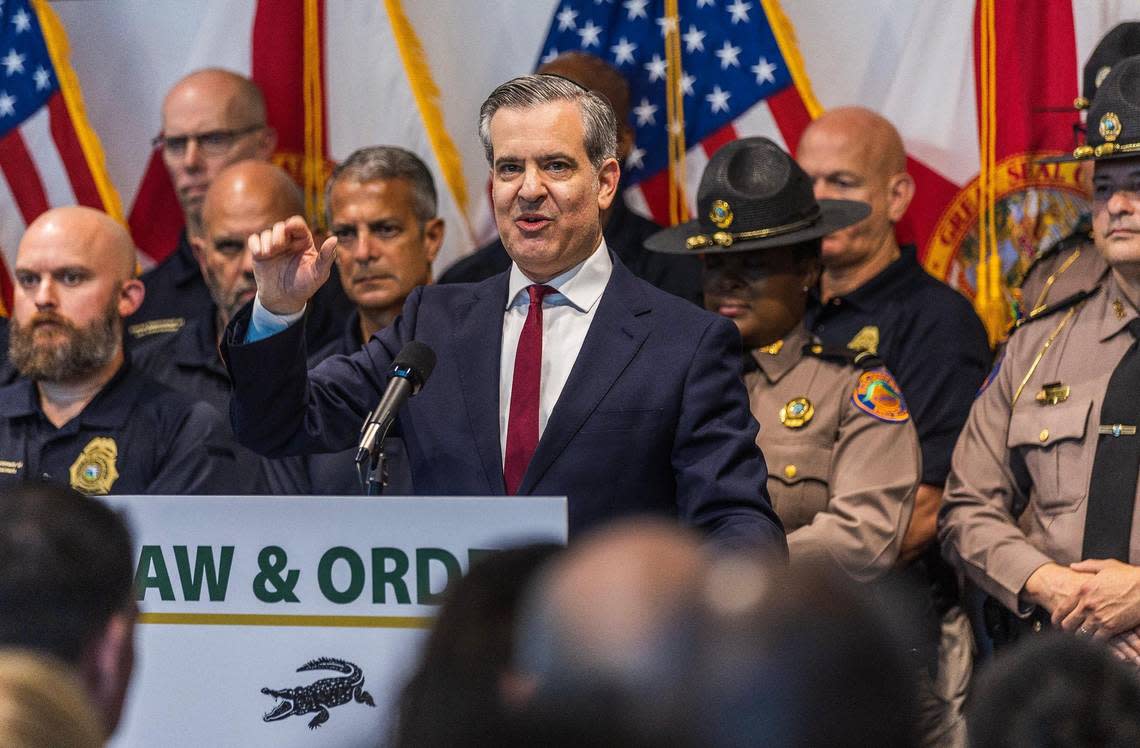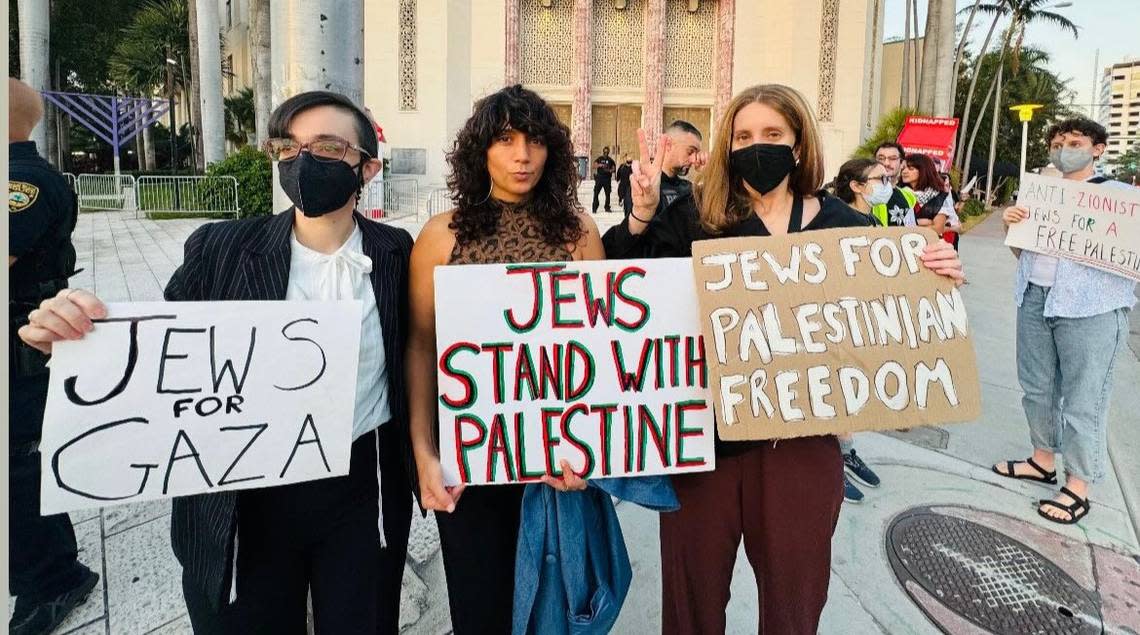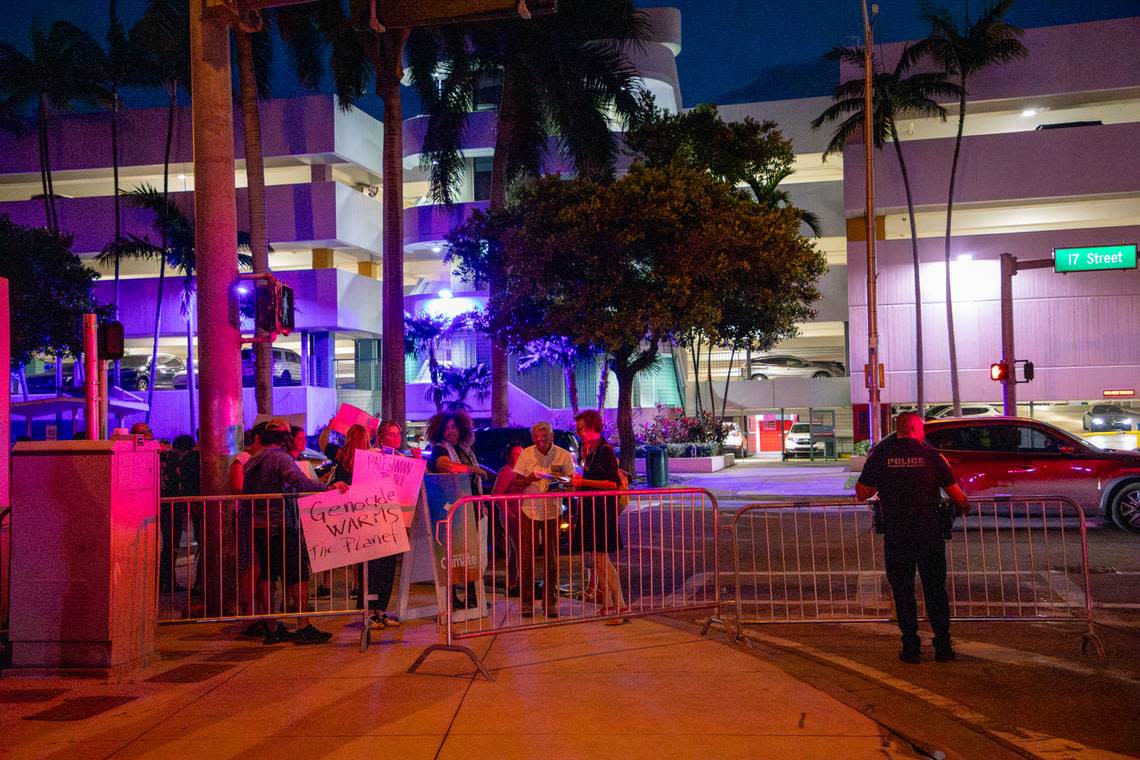Is Miami Beach’s protest crackdown really ‘nonpartisan’? Records show Israel views played role
A resolution by Miami Beach Mayor Steven Meiner to impose new restrictions on protests in the city initially asserted support for Israel and condemned the use of a pro-Palestinian chant before it was edited by the City Attorney’s Office to remove most of those references, according to emails obtained by the Miami Herald.
While much of the language was removed from the resolution that the City Commission passed unanimously March 13, the draft version sheds light on the apparent intentions behind establishing time, place and manner restrictions for protests — despite statements by the mayor at two recent meetings that the Miami Beach government is “nonpartisan” and that his measure “never mentioned” Israel. Although most specific references to the war were taken out of the document in draft stages, one remaining reference to Israel was left in the final version passed by commissioners, a possible oversight.
The draft language could potentially hurt Miami Beach’s ability to enact stricter rules for protesters if the city were to face a legal challenge. The U.S. Supreme Court has ruled that governments can only limit the time, place and manner of speech if it serves a significant government interest and is “content neutral” and “narrowly tailored.”
Howard Simon, the interim executive director of the American Civil Liberties Union of Florida, said the changes made to Meiner’s draft resolution suggest city officials are “doing their best to hide their motivation.”
“The city has lawyers to clean up and get [elected officials] to basically cover up what might have been the original motivation for this, which is to try to prevent pro-Palestinian protest,” Simon said in an interview.
READ MORE: After pro-Palestinian events, protesters will face new restrictions in Miami Beach
The draft version of the mayor’s resolution, originally dated December 2023, began by saying that the aim was to reaffirm “the city’s unwavering support for the state of Israel” and to condemn “the use of all genocidal words, expressions or phrases ... that could be interpreted to mean genocide against any ethnic or religious group, particularly the Jewish people.”
Specifically, the draft resolution said that the controversial phrase “From the river to the sea” is “essentially a Hamas call to annihilate Israel that incites violence and hatred, and threatens the safety and well-being of Jewish people throughout the world.”
The draft language urged police to “make arrests for unlawful behavior by anyone at protests to the fullest extent permitted under the law,” though that line was removed from the final version sponsored by Meiner and Commissioner David Suarez. The draft also described Miami Beach’s “sister city” relationships with two cities in Israel and condemned the Oct. 7 Hamas attacks.
But emails show that, after a March 6 discussion between Meiner and Chief Deputy City Attorney Rob Rosenwald, all but one mention of Israel was removed. The resolution that eventually was presented to and passed by commissioners last month said the city is committed to promoting “peace, justice and tolerance” and “recognizes the importance of fostering strong and peaceful international relations by supporting nations that share these values, including the state of Israel.”
Meiner and a city spokesperson did not respond to questions about the resolution or why much of the original language was removed. The mayor also did not respond to an inquiry about why he incorrectly claimed the final version didn’t mention Israel.

In addition to calling for limits on protests, the measure that passed in March directs police to inform the city’s elected officials of all protests planned in Miami Beach within one hour of learning a protest is scheduled.
“Clearly, we are respectful of free speech,” Meiner said at the March meeting. “Right now, we’re in a situation where our laws are not being enforced.”
The city has yet to establish specific protest regulations in response to the resolution. A new ordinance would need to come before the City Commission for approval.
On the agenda at last week’s City Commission meeting, Commissioner Kristen Rosen Gonzalez proposed an item to rescind Meiner’s resolution and pass a new one “acknowledging the role of peaceful protests in a democratic society” and noting that police can only impose restrictions that are “viewpoint and content neutral and otherwise constitutionally permissible.”
Meiner pulled the item from the consent agenda, preventing it from passing without discussion, but did not call it for a vote during the meeting.
Rosen Gonzalez told the Herald that the city should protect people’s right to speak and criticized Meiner for cutting off pro-Palestinian speakers at recent City Commission meetings.
“What I don’t like is the way Mayor Meiner treats residents who come to speak at our meetings when he screams, snarls and cuts off their mic. That is undignified and we are better than that,” Rosen Gonzalez said in a text message. “Everyone has the right to say what they want, even if we disagree, because we live in the United States of America and we protect our constitutional rights.”
A ‘nonpartisan’ government?
Meiner hasn’t hidden the fact that his concerns about pro-Palestinian protests in the city influenced his resolution.
At the March meeting, he showed video clips of demonstrators protesting a February speech by lawyer Alan Dershowitz at Temple Emanu-El in Miami Beach and chanting on a nearby sidewalk as elderly congregants walked through the crowd. There were no reports of protesters causing physical harm to synagogue members, but Meiner said congregants were “intimidated.”
“As mayor, I will not tolerate our residents being harassed and accosted and threatened for simply trying to pray,” Meiner said, adding that constituents had asked him: “Mayor, how could you let this happen?”
Still, while sparring with pro-Palestinian speakers during City Commission meetings, Meiner has emphasized that the city is “nonpartisan” and stated that his resolution doesn’t mention any country.
“This is a nonpartisan government,” Meiner said in March as he cut off a speaker who referred to Israel’s war in Gaza as a genocide. “I’m not going to sit here and allow you to make accusations about the Israeli government.”
The mayor made similar remarks at a commission meeting last week.
“You did it again. You just can’t help yourself,” he told a speaker who opposed the protest restrictions and called for an end to “the genocide against the Palestinians.”
“This is a nonpartisan commission,” Meiner said.

Simon, the Florida ACLU director, said the city is within its rights to support Israel and foster a relationship with the country. But “allowing people to exercise their First Amendment right does not endanger the city from fulfilling that mission,” he said.
Until the city passes a new law detailing time, place and manner restrictions on protests, Simon said a legal challenge is unlikely. Still, he said, the city’s actions are concerning. In March, pro-Palestinian protesters outside the Aspen Ideas climate conference at the Miami Beach Convention Center were directed to a barricaded “free speech zone” in nearby Pride Park.
“That can’t be the new normal in a country that still has the First Amendment,” Simon said.
A police spokesperson said at the time that a “security zone” had been established around the Convention Center campus because high-level government officials were attending the conference. The free speech zone was set up within the security zone so that protesters could “exercise their First Amendment right to protest, demonstrate, or leaflet,” the spokesperson said.
READ MORE: Gaza war protesters told to use ‘free speech zone’ outside Miami Beach climate conference

The handling of pro-Palestinian protests has become a contentious topic in the city. Suarez blasted Police Chief Wayne Jones at the March meeting for providing what the commissioner said was insufficient protection to congregants at the Temple Emanu-El protest. Suarez suggested the chief, who is Black, would have handled the event differently if it were a “KKK rally” — a remark that Miami Beach police union president Bobby Hernandez said was “uncalled for and political grandstanding at its worst” in a March 18 email to union members.
Jones defended his department’s handling of the event and said the lone incident of violence involved a congregant who “battered” a protester.
While Suarez initially doubled down on his criticism, he said at last week’s meeting that he had met with Jones and that the pair “hashed things out” and “shook hands.”
Sidewalk ordinance in effect
A separate ordinance proposed by Commissioner Alex Fernandez that passed last month outlines rules against blocking streets or sidewalks, making it a crime for someone to obstruct a public right of way after being ordered to leave by police. The ordinance is aimed at the homeless population but also says police should provide protesters with an “adequate and available alternative forum” nearby before making arrests.
While Fernandez’s ordinance wasn’t proposed in connection with Meiner’s resolution, police sought to enforce the ordinance April 3 as a small group of pro-Palestinian protesters held signs outside the entrance to the Miami Beach Convention Center before last week’s commission meeting. Assistant Police Chief Paul Acosta ordered the protesters away from the doors and said they could stand closer to the street instead.
Assistant Chief Paul Acosta says protesters are blocking sidewalk and order them to move away from doors to convention center https://t.co/FzUl7Zmhin pic.twitter.com/oEOwp3PZh0
— Martin Vassolo (@martindvassolo) April 3, 2024
In December, Meiner had raised concerns about a pro-Palestinian protest outside the Convention Center during Art Basel, at which a group of artists unfurled a banner that read “Let Palestine Live.” About 100 people rallied while waving Palestinian flags and holding signs to call for a permanent ceasefire in the war in Gaza.
During that event, police tried to keep protesters away from the Convention Center doors and made two arrests. Days later, Meiner sponsored a discussion item that pointed out protesters were chanting “From the river to the sea, Palestine will be free” and called for the city to set “parameters for reasonable time, place and manner restrictions for protests, including discussion of incitement to violence vs. free speech.”
The mayor never called that item for discussion, but it served as the basis for the March resolution.
“That should not have happened,” Meiner said of the Art Basel protest at a Jan. 16 meeting with residents. “There’s a reasonable time, place and manner to do protests.”
